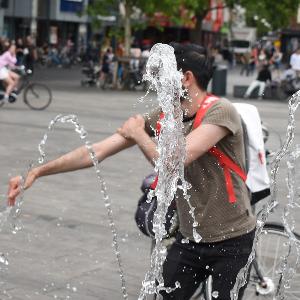Adapting our lives to heat
4 Jul 2023
Heat warnings, tropical nights: extremely hot temperatures are becoming more frequent due to climate change. What now? An interview with medical educator Dr. Julia Schoierer.
4 Jul 2023
Heat warnings, tropical nights: extremely hot temperatures are becoming more frequent due to climate change. What now? An interview with medical educator Dr. Julia Schoierer.

The danger posed by heat depends on many factors, such as humidity, but also on individual aspects, such as physical fitness. | © Adobe Stock
“I’ll be taking it easy today,” says Dr. Julia Schoierer – On the day of our interview, it is too hot for strenuous activities. The medical educator wants to raise awareness of the dangers of heat. Her research focus at the Institute and Polyclinic for Occupational, Social, and Environmental Medicine at University of Munich Hospital is on the health effects of climate change.
Temperatures are rising; summers are getting hotter. What consequences does this have for health?
Julia Schoierer: Heat can make us feel jaded, listless, and restive. But it also has direct impacts on our organs – on our brain, for example, which controls our cooling mechanisms. If the brain is affected by heat, it doesn’t get enough fluid – which is lost through sweating – and our cooling mechanisms cease to work as they should, meaning the body is no longer able to maintain its constant core temperatures.
Hot weather also stresses the cardiovascular system, which struggles to release heat through the skin. Moreover, heat increases air pollution, which puts strain on the lungs. And in combination with the under-intake of fluids, heat also affects the kidneys.
The fact that people sleep worse when it’s hot can’t help matters.T
Yes, lack of sleep negatively impacts our physical and cognitive performance. The risk of accidents increases, as does aggression and propensity to violence.
Heat can make us feel jaded, listless, and restive. But it also has direct impacts on our organs – on our brain, for example, which controls our cooling mechanisms.Julia Schoierer
And yet many people head south on vacation to relax in the sunshine.
On vacation, we can adapt our rhythm to the daytime temperatures. Whereas at home, we have full schedules and have to get things done. So we don’t give ourselves the breaks we need, even though we should be extra mindful of our bodies and allow ourselves short breaks when we feel the strain from the heat. Breaks to have a drink, run water over our forearms, take a cooling footbath, or just relax for a while in a cool place.
Who needs to be extra careful when it’s hot?
A range of different groups, such as pregnant women and their unborn children; infants, because their thermoregulation is not yet fully developed; anyone engaged in hard physical labor outside – and who may be wearing insulating work clothes; caregivers, who do strenuous work indoors; people with chronic health conditions. And naturally the elderly, especially when they live alone, have limited mobility, and have nobody to look in on them. Moreover, elderly people who have difficulties walking usually drink less so that they don’t have to go to the toilet so often. We need to encourage these people to drink more and offer them the support they need.
In Germany, we’re not used to heat massively affecting our health.Julia Schoierer
We often hear stories of young, sporty people who suffer fatal heatstroke.
There are groups of people who do not see themselves in any danger even though the heat is stressing their bodies. In Germany, we’re not used to heat massively affecting our health. So there’s a lot of work to be done to spread this knowledge.
How can people be educated about the risks?
By awareness campaigns in the places where people spend most of their time: in daycare centers, in schools, at work. Older people can be reached through family physicians, pharmacies, and neighborhood assistance organizations. For the general population, posters would make sense – and banners on public transport explaining what measures people should take to protect themselves from the heat.
In schools shortening lesson times alone doesn’t solve the problem. Children need the opportunity to cool down every so oftenJulia Schoierer
Does the issue affect schools?
It’s important to keep rooms cool by drawing blinds and curtains during the day and letting in cool air during the night. It’s a good idea to switch off devices that give off heat but do not need to be running the whole time. Cooling down your body is also important – by taking a shower, say, and not drying yourself afterward. Footbaths are a very effective way of drawing heat from the body. You can also splash water on your face or forearms every now and again. It’s important to drink enough, eat water-rich fruit and vegetables, temper your activities to the temperatures, and prepare yourself for a relaxing daily tempo. If possible, you should seek out cool and shady places.
How can we manage better at home during periods of hot weather?
It’s important to keep rooms cool by drawing blinds and curtains during the day and letting in cool air during the night. It’s a good idea to switch off devices that give off heat but do not need to be running the whole time. Cooling down your body is also important – by taking a shower, say, and not drying yourself afterward. Footbaths are a very effective way of drawing heat from the body. You can also splash water on your face or forearms every now and again. It’s important to drink enough, eat water-rich fruit and vegetables, temper your activities to the temperatures, and prepare yourself for a relaxing daily tempo. If possible, you should seek out cool and shady places.
In general, more flexible break times are a good thing. It also makes sense to rethink starting and finishing times and flexibly adapt them if possible when temperatures are too high.Julia Schoierer

Medical educator Dr. Julia Schoierer. | © J. Schoierer
And how can we reduce heat stress in the workplace?
In general, more flexible break times are a good thing. It also makes sense to rethink starting and finishing times and flexibly adapt them if possible when temperatures are too high. Rules on uniforms and work clothing need to be relaxed and drinks must be provided close at hand. Personnel planning should also take the issue into account. This is not easy, because there are staff shortages in many sectors. But I know of volunteers, for example, who fill in during periods of hot weather and give care home workers a break.
Will the world of work have to change overall?
Yes. Heatwaves are becoming more frequent, more intense, and longer in duration. The world of work has to adapt. Spain is currently considering a ban on outdoor work during periods of extreme heat. Of course, this is not possible across the board. Police officers, paramedics, agricultural workers, and other categories of worker cannot just pack in their duties over the summer. But the proposal should prompt our societies to reconsider how we deal with heat.